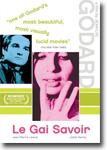 |
|
|||||||||||||||||||||||||||||||||||||||||||||||||||||||||||||
I do not mind being challenged by a film to decipher its meaning; indeed, I often enjoy these films. One of my favorite directors is David Lynch, of Mulholland Drive Wrong. This is the most challenging review I have yet tried to write, simply because I'm struggling how to explain this movie. There is really no plot to it. The basic story: two Marxist activists (Jean-Pierre Léaud and Juliet Berto) hole up in a TV studio at night and rail against bourgeoisie society, cinema and philosophy. Their discussions often become nonsensical and sometimes collapse into a mere recitation of words. The film then becomes a collage of different images on the screen (with Vietnam atrocities and female nudes being the prevalent images). From what I gather, the goal of all this is to show how language is often married to a particular visual image and how society's leaders can pair any word with any image in order to get a desired effect. From what I gathered, the two leads decide that language itself is "the enemy" or the weapon by which leaders confuse and control the masses. Their solution: because words condition behavior, the masses can free themselves by destroying old words and creating a fresh, new vocabulary with new meaning (the male lead seems quite proud of himself at the end when he seemingly has created a new word). If this summary sounds "over your head," trust me, it was over my head, too. Try deciphering all this from watching the film. To be honest, while I appreciate the film's uniqueness, I did not enjoy it at all. The film was primarily a discourse on language and a political rant with almost no intention of being entertaining. I don't think it is asking too much for it to at least try to entertain; even the most challenging films can be very entertaining, even through offering the viewer an intriguing puzzle to solve. It doesn't help that the two leads basically came off as pompous, arrogant twits. They (and apparently Godard) seem to think it worthwhile to spend their nights smoking, eating croissants and railing against all things Capitalism. Furthermore, the film's rhythmic pattern of cutting to a still of a supposed Vietnam atrocity, to a pornographic picture, to a fashion magazine, to blackness, to the two leads looking surly and spouting nonsense, then repeating, finally became exasperating (it also doesn't help that the soundtrack often features a hard-to-understand off-screen narrator (Godard), as well as moments where all that is heard is a loud electronic pulse like those once heard on tests of a TV channel's emergency broadcast system). I knew this film was going nowhere, and I could not wait for it to end. This film encapsulates what many people who hate foreign films feel about them: it is extremely pretentious, dull and makes no sense. There's probably a film historian somewhere who feels I'm being way too hard on such a unique, challenging film, but I'm just being honest how I feel about a film that seems more concerned with lecturing than entertaining its audience. I'm sure Le Gai Savoir Extras: There are no advertised extras on this DVD, but the trailer for Godard's film La Chinoise plays before the main menu loads. |
|
|||||||||||||||||||||||||||||||||||||||||||||||||||||||||||||
|
||||||||||||||||||||||||||||||||||||||||||||||||||||||||||||||
| action | animation | art house/international | comedy | documentary | drama | family | horror/sci-fi | suspense | television | ||||||||||||||||||||||||||||||||||||||||||||||||||||||||||||||
| contact | home | ||||||||||||||||||||||||||||||||||||||||||||||||||||||||||||||


